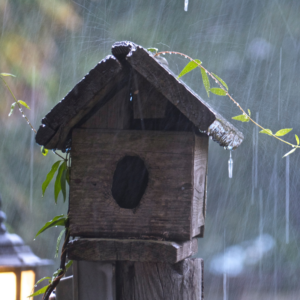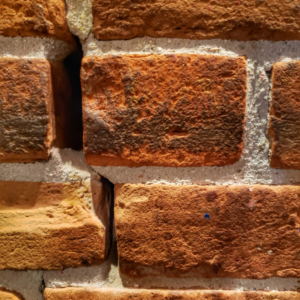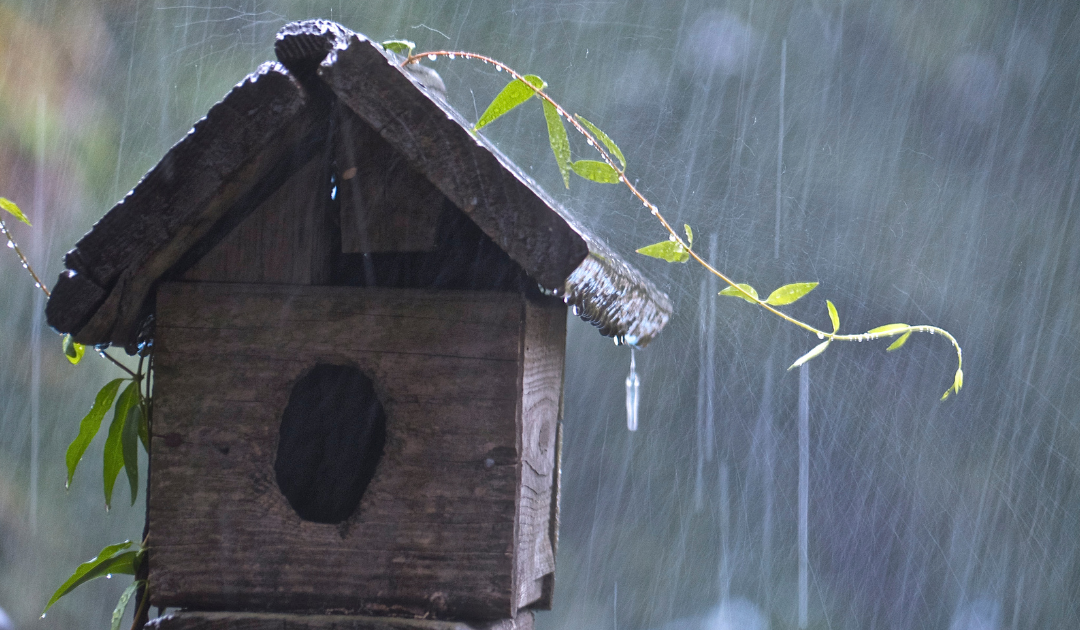Chimney leaks can be a real pain in the flue. Water is a chimney’s worst nightmare and when it finds its way inside it can wreak all sorts of havoc. Fortunately, if you know what to look for, you can spot leaks early and avoid the pain and expense that comes from unnoticed problems. With a little help from the crew here at Dunrite Chimney you can both get those leaks repaired and prevent them from being a problem in the future.
Signs of Chimney Leaks
Water Stains
 One of the most obvious signs of chimney leaks is water stains on the ceiling or walls near your chimney. These stains may be yellow or brown and could indicate that water is coming in somewhere it shouldn’t be. Not only will water stain your walls and ceiling, it will also cause paint and wallpaper to peel. If you notice stains or peeling paint, take action immediately.
One of the most obvious signs of chimney leaks is water stains on the ceiling or walls near your chimney. These stains may be yellow or brown and could indicate that water is coming in somewhere it shouldn’t be. Not only will water stain your walls and ceiling, it will also cause paint and wallpaper to peel. If you notice stains or peeling paint, take action immediately.
Musty Smells
When water gets into a chimney it can mix with the chemicals that collect on the walls of the flue. This mixture can cause a damp musty smell to emanate from your fireplace. Your chimney should be dry, so if you smell unwanted odors from your fireplace it’s time to look for a leak.
Damaged Chimney Liner
While your chimney liner is built to withstand high temperatures, it is not necessarily going to stand up to water. If you see damage on your chimney liner it’s likely because something unwanted is happening behind the scenes. Dunrite Chimney can help you pinpoint the source of the problem, and if it is a leak, we are capable of getting it fixed before it causes further damage to your chimney or other parts of your home.
Causes of Chimney Leaks
Damaged or Missing Chimney Cap
There are many parts of a chimney that are designed to keep water out of your chimney and your home. One of these is the chimney cap. A chimney cap sits on top of your chimney and protects your flue from precipitation and debris. If it is damaged it will do its job poorly – or not at all.
Damaged or Missing Flashing
Another cause of water getting where it shouldn’t is damaged or missing flashing. Flashing sits at the junction of your chimney and your roof, and it keeps water from running down the exterior of your chimney and getting in through this spot. Essentially, it directs rain and melting snow away from an otherwise vulnerable intersection.
The Freeze/Thaw Cycle
 Perhaps the most dangerous cause of chimney leaks comes from the freeze/thaw cycle.
Perhaps the most dangerous cause of chimney leaks comes from the freeze/thaw cycle.
Many homeowners forget that brick and mortar are quite porous and absorbent. When unprotected masonry is exposed to moisture water can collect in these tiny holes in cracks where it will hide out until the weather changes. As the temperature drops, the water naturally expands, forcing those holes and cracks to expand with it. When the weather warms up again these larger cracks and holes take on more water. The cycle continues every time things freeze up again.
If left unchecked and unrepaired the freeze/thaw process can damage the structure of your chimney so severely that it will weaken, crumble, and possibly fall apart. Water is then able to easily enter your home at these weak points in your masonry, leading to wood rot, mold growth, and other damage.
If you have seen any of the signs of a chimney leak or have noticed any weaknesses in your chimney cap, flashing, or masonry, it is necessary to fix the problem and prevent future problems caused by water. Dunrite Chimney has a team of professionals ready and equipped to help you do just that.
How to Prevent Future Chimney Leaks
Clean Your Gutters
Keeping your gutters clean and free of debris is an important part of making sure that water has a place to go as it comes off your roof. A gutter filled with sticks and leaves can cause water to pool up on your roof and look for other ways to exit. Your chimney might become a prime candidate for the rain water’s exit strategy. While you are at it, make sure your downspouts are directing water away from your chimney and foundation.
Trim Your Trees
Those clogged gutters had to get that debris from somewhere. Often trees that are close to the chimney can drop leaves and sticks onto the roof and into your gutters. In more severe circumstances, branches can fall and damage your chimney’s structure or the chimney cap on top. Keep those trees healthy by getting them trimmed up.
Waterproof Your Masonry
Having your chimney professionally waterproofed is one of the most effective measures you can take in preventing water from damaging it. At Dunrite Chimney we use vapor-permeable solutions that are designed to let moisture vent off your brick and mortar, while keeping precipitation from penetrating it.
We’re Here to Help You Out
Our team of chimney experts are trained to see the weak spots of your chimney and get them strengthened before applying sealants. Our knowledge and experience will have your chimney guarded against moisture for years to come.
Schedule an inspection and waterproofing for your masonry today. Call 631-738-0005 or book with us online.


Recent Comments